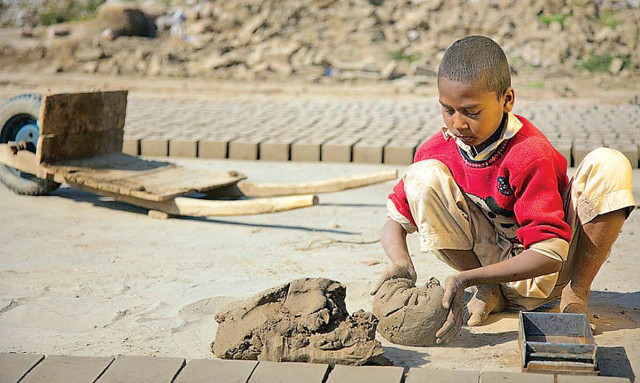The lifelong cost of debt

Peshagi, or debt bondage, is a form of bonded labour where employers keep workers as virtual slaves if the workers are unable to repay their loans. In Pakistan, over one million people continue to work as bonded labourers in brick kilns across the country, despite a Supreme Court order two years ago to abolish the practice.
Mumtaz Ahmed, 41, has been working at a brick kiln in the Koral area since he was only four-years-old. Now his entire family, including his wife and six children, are also working with him to repay a debt which Mumtaz’s parents owed.
He works every day from dawn to dusk and earns Rs1500 per week. He said it is very difficult for him to cover household expenses with this wage. “I want more than anything to be able to repay this debt.”
Hundreds of brick kiln workers live in the outskirts of Islamabad in miserable conditions. Young children start working with their parents as well, to contribute for the debt payment. Maroof, 12, said he wanted to go to school like other children but because of their family debt, he was forced to continue working with his parents at a brick kiln.
However, Raja Muhammad Ameen, a Bhatta owner at Koral, denied allegations that Bhatta owners exploit their labour. “They are free to leave this profession at any time.” He said they have two kind of labour at the kilns; workers who are hired either on a contract basis or on daily wage basis. “Those who are paid daily wages get enough money to cover their utility bills and other expenses,” he added.
Dr Alwin Murad, who works as an advocate for labour rights, said bricks kilns workers in Pakistan are living in miserable conditions and despite a Supreme Court judgment against bonded labour, people are still being subjected to slavery because of debt bondage.
He said that brick kiln labourers are paid a very small amount for the long hours that they put in, and in some cases, “these workers are sexually exploited as well.”
He stressed that the Supreme Court judgment should be strictly implemented so that bonded labour can be discouraged in the country.
Published in The Express Tribune, August 3rd, 2010.



















COMMENTS
Comments are moderated and generally will be posted if they are on-topic and not abusive.
For more information, please see our Comments FAQ